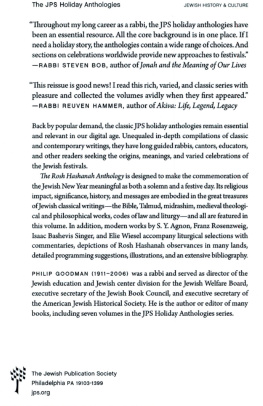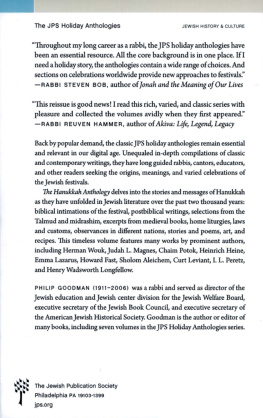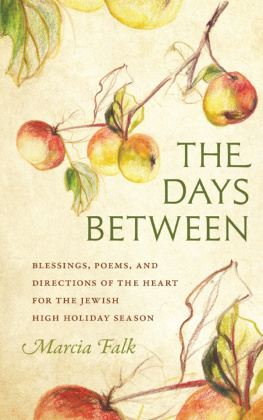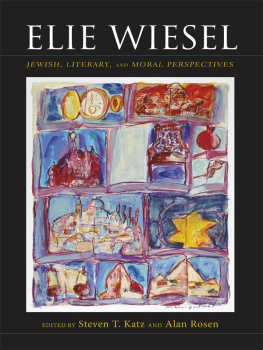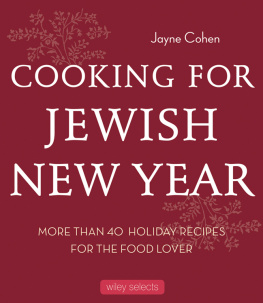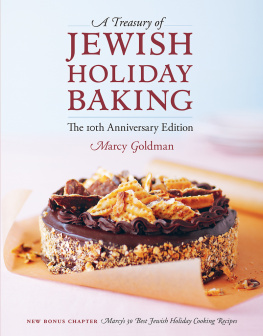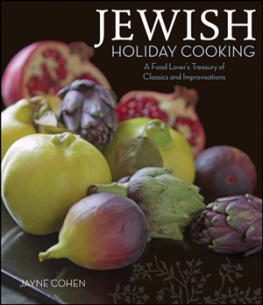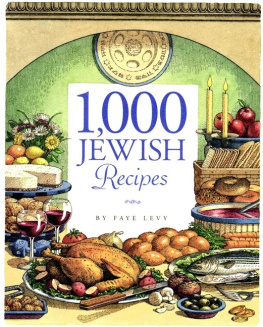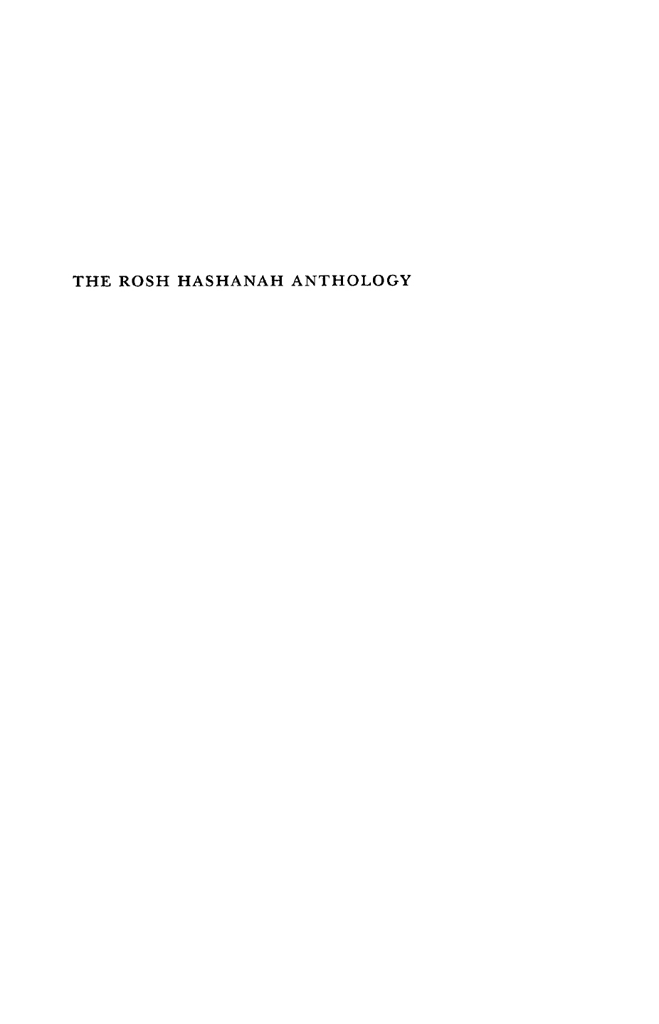
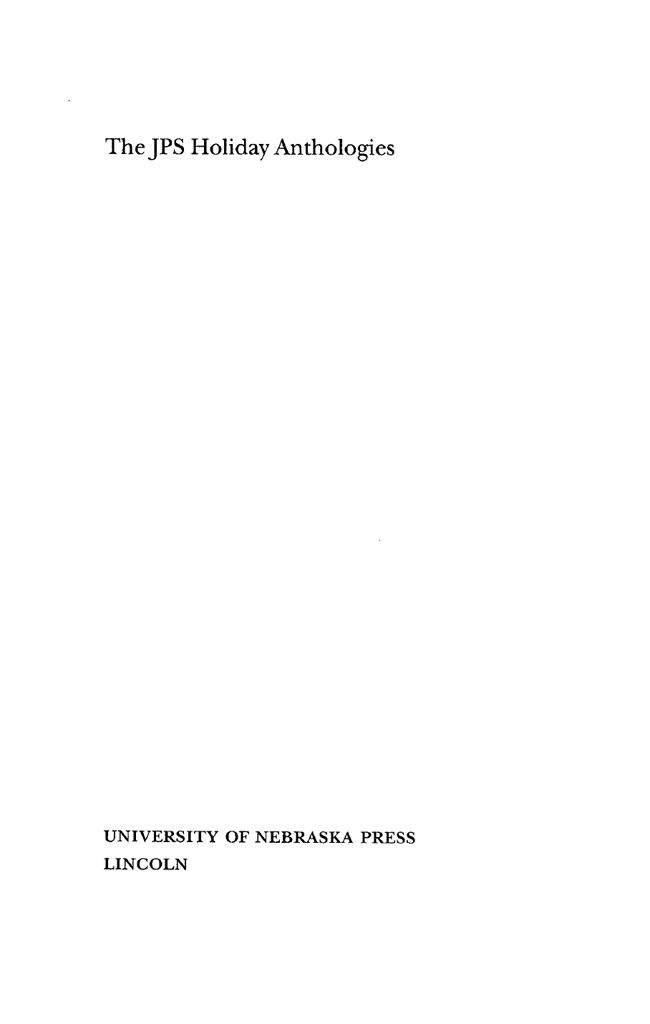

1970 by The Jewish Publication Society of America
Acknowledgments for the use of previously published material appear on pages xxix-xxxv, which constitute an extension of the copyright page.
All rights reserved. Published by the University of Nebraska Press as a Jewish Publication Society book.
First Nebraska paperback printing: 2018
Library of Congress Control Number: 2018934566
ISBN 978-0-8276-1375-1 (epub)
ISBN 978-0-8276-1376-8 (mobi)
The publisher does not have any control over and does not assume any responsibility for author or third-party websites or their content.
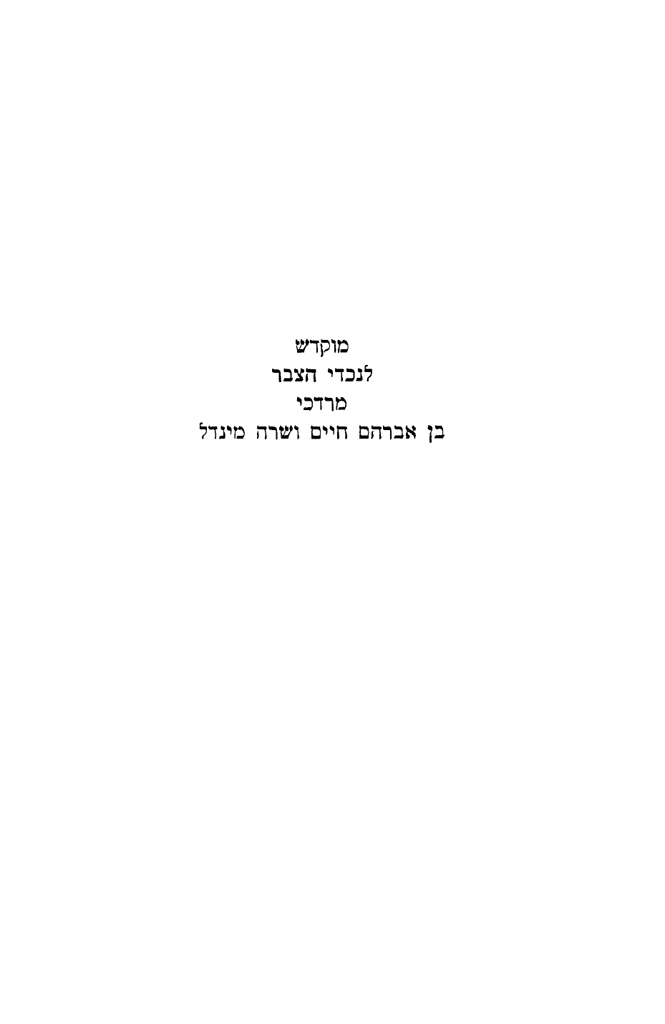
ILLUSTRATIONS
A NOTE FROM THE PUBLISHER
The JPS Holiday Anthologies are unequaled compilations of Bible, Talmud, prayer, poetry, and folklore.
When I first began studying Judaism, and later as a young rabbi, these books were indispensable aids in learning and teaching about the holidays. They took a place of pride on my essential reference bookshelf, right next to The jps Tanakh and The jps Torah Commentary.
Even in our digital age they deserve a similar place on the bookshelf of the next generation of rabbis, cantors, educators, and readers seeking the meaning and origin of the Sabbath and Jewish festivals.
These classics deserve to be available mdorldor, from one generation to the next, and we are pleased to make that commitment in this reprint series.
RABBI BARRY L. SCHWARTZ
Director, The Jewish Publication Society
PREFACE
Unlike the New Year celebrations of most peoples, characterized by revelry and hilarity, Rosh Hashanah is observed with a solemnity that is marked by prayer, contemplation, and selfsearching. It initiates the pensive ten-day cycle known as the Days of Awe, which terminate with the Day of Atonement, the holiest day in the Jewish calendar. Despite its solemn character, Rosh Hashanah is a festival when the Jew prays that the righteous shall see and rejoice, the upright shall exult, and the devout shall delight in song (Mahzor).
This serious and optimistic pattern is clearly adumbrated in the biblical injunctions in Leviticus 23.24, In the seventh month, on the first day of the month, you shall observe complete rest, a sacred occasion commemorated with loud blasts, and Nehemiah 8.9-10, This day is holy unto the Lord your God; mourn not, nor weep neither be ye grieved; for the joy of the Lord is your strength.
The commingling of joy and earnest meditation on Rosh Hashanahin the words of the psalmist rejoice with trembling (2.11)is in itself a sublime lesson, an exercise in spiritual enhancement. On this Day of Judgment, motivated by a profound faith in Gods mercy and loving-kindness, the Jew renders an accounting of his life and actions during the past year before the Supreme Judge. But he does so with a feeling and ardent hope that the Almighty will pardon his shortcomings and gratify his yearning for spiritual regeneration. Such a hope is buttressed by the Jewish belief in the efficacy of teshuvah repentance, returna religious concept which runs like a gossamer thread throughout Jewish literature and which has nurtured Jewish religious stamina through the ages.
The focus on the theme of repentance is reflected in the name Aseret Yeme Teshuvah, Ten Days of Repentance, which span the High Holy Days, beginning with Rosh Hashanah and concluding with Yom Kippur. The month of Elul, which precedes Rosh Hashanah, acquires a special preparatory status in that its liturgy includes the recitation of Selihot (penitential prayers) and the sounding of the shofar. Elul is the gateway leading to the quest for spiritual renewal, reevaluation, and rehabilitation, by which mundane impediments to genuine communion with God are removed. This quest reaches its zenith during the Days of Awe, when the individual Jew becomes aware of an inner dimension which elevates him, as if on a Jacobs ladder, nearer to his God.
The significance of Rosh Hashanah, its history and message, is embodied in the great treasure trove of Jewish classical writingsin the Bible, Talmud, midrashim, medieval theological and philosophical works, codes of law and liturgy. Modem creative writers have added their interpretations in prose and verse on the import of the Days of Awe. Historians, biographers, and folklorists have also enriched the source material, providing a heightened dimension to these holy days. From this vast literature, accumulated over many generations, we have culled but a modest sampling for The Rosh Hashanah Anthology. It proposes to portray the message, the religious impact, and the manner of commemoration of the Jewish New Year both as a solemn and as a festive day. While we cherish the hope that this volume will deepen the readers knowledge of Rosh Hashanah and thus render possible a more meaningful observance, we trust that it may also whet his appetite and stimulate further study. The bibliography herein includes many worthwhile books, notably S. Y. Agnons Days of Awe. Attention is called to the many other valuable resources listed in the Bibliography. It is to be hoped that parents and their children, rabbis, educators, and group workers will find something of interest and illumination in The Rosh Hashanah Anthology.
This is the fifth volume of the Jewish holiday series of The Jewish Publication Society of America. The preceding volumes are Hanukkah-. The Feast of Lights, by Emily Solis-Cohen (i937); Sabbath: The Day of Delight, by Abraham E. Millgram (1944); and The Purim Anthology (1949) and The Passover Anthology (1961), by Philip Goodman. The next volume in this series will be The Yom Kippur Anthology, also by the present author.
I welcome this opportunity to express my sincere gratitude to all colleagues and friends from whom I obtained assistance in the compilation of this volume. I am particularly indebted to my collaborators who have written original articles at my request: Dr. Joseph Gutmann, professor of art history, Wayne State University, Detroit, who wrote the scholarly article Rosh Hashanah in Art; Dr. Alexander Alan Steinbach, editor of Jewish Book Annual and In Jewish Bookland, who composed the fascinating chapter on Rosh Hashanah Parables; and Cantor Max Wohlberg, professor of Hazzanut, Cantors Institute of The Jewish Theological Seminary of America, who contributed the erudite essay on The Music of the Rosh Hashanah Liturgy.
My deep appreciation is extended also to the following persons who have given me helpful suggestions: Aryeh Ben-Gurion, Bet ha-Shitah, Israel; Irene Heskes, staff consultant of the National Jewish Music Council; Dr. I. Edward Kiev, librarian of the Hebrew Union College-Jewish Institute of Religion, New York; Sylvia Landress, director of the Zionist Archives and Library; Rabbi and Mrs. Herbert Parzen, New York; Bernard Postal, director, Public Information, National Jewish Welfare Board; Rabbi Irving Rubin of Congregation Kesher Israel, West Chester, Pennsylvania; Jacob and Ruth Schreiber, Heftzibah, Israel; Dr. Elias Schulman, librarian of the Jewish Education Committee of New York; and Dora Steinglass, chief of the Jewish Division, New York Public Library.
I am most grateful to Dr. Chaim Pofok, editor, and Lesser
Zussman, executive director, of The Jewish Publication Society of America for encouraging me to undertake the preparation of this volume. The Societys copy editor, Mrs. Kay Powell, read the manuscript with painstaking care. Dr. Sidney B. Hoenig, professor of Jewish history, Yeshiva University, kindly consented to examine the manuscript and offered much helpful criticism and many excellent suggestions. I benefited greatly from the critical judgment and literary craftsmanship that was so graciously given by Dr. Alexander Alan Steinbach. Words do not suffice to express the appreciation I owe to my wife, Hanna, a true helpmate in all my literary endeavors.
Next page
